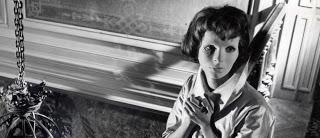 Georges Franju's Eyes Without a Face (1959) is a striking work of stylized horror. Along with the writing team Bouileau-Narcejac, whose novels inspired Les Diabolique and Vertigo, Franju turns a silly premise into an aching, gothic tragedy.
Georges Franju's Eyes Without a Face (1959) is a striking work of stylized horror. Along with the writing team Bouileau-Narcejac, whose novels inspired Les Diabolique and Vertigo, Franju turns a silly premise into an aching, gothic tragedy.Dr. Genessier (Pierre Brasseur) works to cure his daughter Christiane (Edith Scob), disfigured in an accident. Along with assistant Louise (Alida Valli), Genessier kidnaps women and removes their faces, hoping to transplant them onto Christiane. The operations invariably fail, leaving Christiane depressed and wondering why she's more important than the victims. But the Doctor soldiers on, racking up a body count that draws police attention.
Eyes Without a Face resembles the plot of a Z picture like The Brain That Wouldn't Die. Franju redeems the material with faultless artistry. The movie has a deceptively calm mise-en-scene, Genessier's home an elegant mansion with a surgical chamber hidden in the basement, alongside crates of doomed dogs who becomes Christiane's only friends. Long scenes play without dialog or music, as when Genessier buries a victim, noises drowned by an airplane. It's too elegant to be exploitative.
Which doesn't mean Eyes skimps on disturbing material. The film's centerpiece is an exceedingly graphic face-peeling surgery, still disgusting after decades of even more explicit eviscerations. Filmed in an unblinking long take, it's clinical without sacrificing shock value. If anything, the detached approach and slow pacing enhance its impact, highlighting the Doctor's amorality. It's easier to understand a madman like Frankenstein than Genessier, who views mutilation as a grim duty.
Franju's more interested in Eyes' existential horror. Christiane glides through the mansion with an immobile mask hiding her features, accompanied by Eugen Schufftan's camera and Maurice Jarre's elegantly disjointed score. Isolated from the outside world, she's prevented from calling her fiancé Jacques (Francois Guerin) and pities the Doctor's victims. When she finally receives a fitting face it rots away, leaving her shattered. Ultimately, Christiane suffers tragic living death, trapped by her father into hoping experiments will pay off.
Pierre Brasseur plays the right note of understated menace, a doctor who views his experiments as necessary, not bothering with elaborate justifications. Alida Valli's blind loyalty makes her a fierce foil; she's revealed as a victim saved by similar treatment. But Edith Scob inevitably dominates the show, allowing emotion to pierce her prosthetic rictus through pained voice and silent tears. The moments granting her a real face allow Scob a striking moment of joy, sadness and regret.
Horror generally struggles to transcend exploitation, but Eyes Without a Face achieves it effortlessly. Its gore and scares aren't as affecting as its banal villains and tragic protagonist. The finale, with Christiane escaping as doves and dogs flit around her, is as poignant a scene offered by any horror movie.

